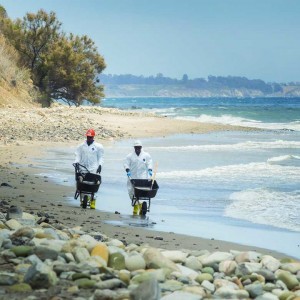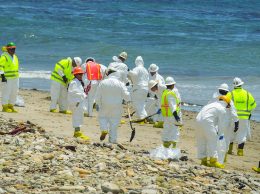Dubroff: Litigation, criminal probe could put squeeze on oil pipeline operator
IN THIS ARTICLE
- Central Coast Topic
- Henry Dubroff Author
By Henry Dubroff Friday, July 3rd, 2015
When Barry Cappello litigates, people listen.
Which is why his June 23 lawsuit seeking class action status and unspecified damages against Plains All American Pipeline may prove to be a turning point in the sorry history of the Refugio oil spill.
“It was a disaster waiting to happen again and again,” is the way Cappello described the badly corroded pipeline that gave way on May 19, spilling roughly 100,000 gallons of crude oil, sending about 21,000 gallons down a culvert and into the ocean. His lawsuit, filed on behalf of Pacific Coast property owners, states: “While this spill is a disaster it is no accident.”
Cappello is the former Santa Barbara city attorney who sued Union Oil after the 1969 oil spill that devastated the coast and provided much of the impetus for the environmental movement. Over the years he’s litigated on behalf of a number of corporate clients and recently forced the city of Santa Barbara to abandon its at-large city council election scheme on the grounds it was disenfranchising Hispanic voters.
In a phone conversation about the Refugio spill, Cappello said that Plains’ failure to provide automatic shut-down devices for Line 901 is at the heart of his case.
The lawsuit alleges Plains “wantonly disregarded the safety of the people and environment by operating a pipeline it knew did not have proper safety systems in place.”
Plains did not respond to requests for comment addressed to its Texas headquarters and Refugio Spill Unified Command response center.
Among the remedies Cappello seeks is a court order that requires Plains to install the automatic shut-off devices that Plains circumvented in the late 1980s when it went to court and won the right to have the only pipeline in Santa Barbara County regulated only by the federal government.
“It’s too late” to halt the damage from the May spill but Cappello said he hopes to convince a judge to “eat the capital cost” of operating safely. “Plains has an ugly ‘tradition’ of operating pipelines that fail,” the lawsuit alleges, stating that the company’s way of doing business shifted the risk of environmental damage onto the shoulders of Santa Barbara’s “citizens, real property owners and environment” while the company reaped the rewards.
Cappello’s lawsuit is on behalf of a trust that owns property near Refugio State Beach and it seeks class action status to represent several thousand property owners along the Pacific Coast.
Already tar balls have washed up on beaches in Ventura and Los Angeles counties and Cappello thinks that more oil will wash up on California beaches over the next “three or four years.”
His lawsuit is likely to get some traction for several reasons. First, the damages suffered by landholders are likely to be more sustained and easier to prove than those suffered by fishermen whose grounds were reopened on June 29.
Second, the properties involved are worth billions of dollars so that even temporary disruptions via tar ball intrusion can be quantified and the number of plaintiffs will likely grow.
Third, although Cappello said he hasn’t talked to law enforcement about the evidence he has gathered, there is a parallel criminal investigation being conducted by Attorney General Kamala Harris and Santa Barbara County District Attorney Joyce Dudley. Whatever the criminal probe turns up will benefit Cappella’s case and vice versa — putting Plains in a bit of a legal vise.
Meanwhile, yet another potential legal problem is looming for Plains as operations shut down and ExxonMobil and Venoco among others have no place to ship their oil.
That’s because in addition to shutting down Line 901, the June 3 order by Jeffrey Weise, associate administrator of the Department of Transportation’s Pipeline and Hazardous Materials Safety Administration has shut Line 903, which connects to the shorter pipeline that ruptured on May 19.
Pipeline 903, which runs 128 miles from Santa Barbara to Kern County, remains shut until Plains proves to the government that it can be operated safely. Even if it can re-open, volume is likely to be limited to 80 percent of average capacity over the past few months and other restrictions are likely to apply.
Every day they can’t move oil through to Kern County, the oil companies also are tolling up economic damages. My guess is those will also cost Plains a pretty penny.
So far, Plains is hanging tough, stating in SEC filings that it simply can’t quantify total costs, including possible civil and criminal claims. Cappello said that while he’s filed the suit he hasn’t served Plains — a development expected in the next week or two.
Perhaps then we’ll get an answer from the company. But I’m not holding my breath.
• Reach Editor Dubroff at [email protected].













